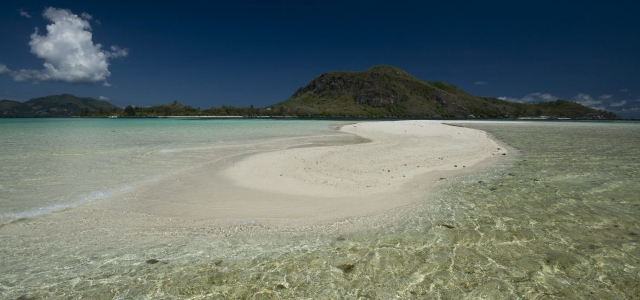Project Name: UNDP-GEF project “Supporting Sustainable Inclusive Blue Economy Transformation in African Small Island Developing States (SIDS)
Financing: Global Environment Facility (GEF)
Duration: 2025 to 2028
Implementing Agency: United Nations Development Programme (UNDP)
Executing Agency: Global Water Partnership Southern Africa (GWPSA)
Continental Custodians: African Union Commission (AUC)
Project Value: USD 32.2 million (GEF grant of USD 9 million and co-financing of USD 23.2 million)
Geographical Location: Cabo Verde, Comoros, Guinea-Bissau, Mauritius, São Tomé and Príncipe, Seychelles
About the Project
Small Island Developing States (SIDS) face unique challenges, but they also hold valuable opportunities when it comes to protecting their natural environments and meeting their socio-economic development needs. Against this backdrop, the United Nations Development Programme (UNDP) and Global Environment Facility (GEF) project -“Supporting Sustainable Inclusive Blue Economy Transformation in African SIDS” (the African SIDS Project), has been launched to support six African island nations in the Atlantic and Indian Oceans: Cabo Verde, Guinea-Bissau, São Tomé and Príncipe, Comoros, Mauritius, and Seychelles. The project seeks to help these countries move towards sustainable, inclusive, and climate-resilient blue economy development.
In São Tomé and Príncipe, the project will place special focus on restoring degraded land and reducing ocean pollution caused by land-based activities.
While acknowledging the broad range of development needs faced by African SIDS, the project has been strategically designed to address the root causes that often block progress and to remove barriers to sustainable blue economy growth. It will do so by fostering South-South learning and triangular cooperation, allowing countries to share knowledge, experiences, and solutions.
The African SIDS Project will strengthen governance and policy environments in all participating countries, creating the foundation for national blue economy transformation. It will also pilot six national blue economy demonstration projects and one land degradation neutrality “ridge-to-reef” demonstration project, showcasing innovative practices and solutions that can be scaled up.
In addition, the project will promote information sharing and knowledge management, ensuring that data, lessons, and good practices are accessible to all stakeholders. This will not only enhance cooperation among African SIDS but also connect them with the wider global SIDS and ocean community.
The project contributes to the African Union’s Blue Economy Strategy, Agenda 2063, and global commitments, including the Sustainable Development Goals (SDGs), particularly SDG 14: Life Below Water, and SDG 13: Climate Action.
Geopolitical, Environmental and Socio-Economic Development Context
Small Island Developing States (SIDS) are a group of 38 UN Member States and 20 Non-UN Members or Associate Members of UN regional commissions. They are spread across three main regions:
- The Caribbean
- The Pacific
- The Atlantic, Indian Ocean, and South China Sea
SIDS are recognized globally as a special case for both environment and development. At the 1992 UN Conference in Rio de Janeiro, they were described as “low-lying coastal countries that share similar sustainable development challenges, including small populations, limited resources, high exposure to natural disasters, vulnerability to external shocks, and heavy dependence on international trade.”
The Paris Agreement (Article 8) further highlights that climate change poses serious risks to SIDS, including “loss and damage.”
This project focuses on six African SIDS in the Atlantic and Indian Oceans: Cabo Verde, Guinea-Bissau, São Tomé and Príncipe, Comoros, Mauritius, and Seychelles.
Globally, SIDS have a combined population of about 65 million people (less than 1% of the world’s population). Despite their small size, they face such unique environmental, economic, and social vulnerabilities that they require special international attention. The six African SIDS together account for 5.06 million people (2021).
In terms of development, many SIDS are among the world’s poorest nations. Eight are classified as Least Developed Countries (LDCs), including three African SIDS: Comoros, Guinea-Bissau, and São Tomé and Príncipe. Meanwhile, Cabo Verde, Mauritius, and Seychelles are emerging economies, showing stronger growth and lower poverty levels.
The African SIDS Project Objectives
The project aims to:
- Strengthen governance and policies for sustainable blue economy growth.
- Pilot innovative practices and investments that restore land, protect marine ecosystems, and reduce pollution.
- Share knowledge and build cooperation among African SIDS and with the wider global SIDS community.
Key Project Components
1. Enabling Conditions and Governance
- Strengthening policies, legal frameworks, and institutions to create an enabling environment for blue economy transformation.
2. National Demonstrations
- Pilot projects in each country showcasing sustainable ocean and coastal practices.
- A special land degradation neutrality demonstration in São Tomé and Príncipe, linking land restoration to healthy marine ecosystems.
3. Knowledge Management and Scaling Up
- Creating platforms for information sharing and south-south cooperation.
- Promoting lessons learned across Africa and globally.
Project Significance
- Economic importance: In African SIDS, tourism and fisheries account for a significant share of GDP (for example, tourism contributes 36% in Seychelles and 28% in Cabo Verde).
- Environmental sustainability: Rising sea levels, land degradation, overfishing, and marine pollution threaten both livelihoods and ecosystems.
- Global relevance: These island states are custodians of vast ocean territories critical for biodiversity, climate regulation, and sustainable development.
Expected Outcomes
- Stronger blue economy governance frameworks in all six countries.
- On-the-ground demonstration projects showing practical solutions for sustainable ocean and land use.
- A framework for land degradation neutrality established in São Tomé and Príncipe.
- Improved regional cooperation and knowledge exchange among African SIDS.
- Engagement of the private sector and development of sustainable financing models to secure long-term benefits.
